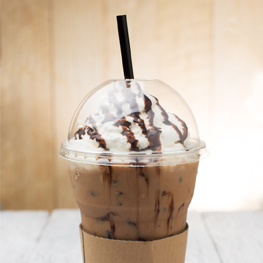
Nowadays, it’s trendy to hang out in coffee shops sipping not only coffee, but also a variety of coffee-related drinks from lattés to spiced tea drinks to frappy-iced-things of some kind or another. The names of these items can suggest something delicious and foreign, tempting every cell in our bodies to indulge. But amidst the complications of elaborate titles and ingredients lists that don’t exactly tell all, do people actually know what they’re getting, and more importantly, do they know what they’re feeding their children? Rory Hornstein, a Registered Dietitian in Calgary, says no, and points to caffeine as the first and most obvious demon on the list.
“Most of the drinks have too much caffeine. So if it’s a frozen lattéthat has a cup of coffee in it, it’s going to have 100 milligrams. And size is a big aspect. A lot of kids don’t want to get a kid size,” she says.
Caffeine directly affects the nervous system so it can have a detrimental effect, causing insomnia or restlessness in children who can tolerate significantly less than adults, says Hornstein. And if a child already experiences health issues, anxiety, behavioral issues or even a heart condition, for example, it can exacerbate these, she says.
“It can be hard on focusing in general, if you have that anxious feeling. The effect of caffeine can be drawn out between four and six hours, so if your kids are picking it up on the way to school, it can affect their learning,” says Hornstein.
Along with caffeine being a stimulant, it is also an appetite suppressant. In her practice, Hornstein has seen young people concerned about body image use caffeine as a diet aid. But going hungry for too long during the day can actually have the effect of lowering metabolism, and ultimately causing weight gain. And skipping meals that would provide real nutritional content can seriously impact their health, she says.
“Caffeine can cause excito-toxicity in the brain, and then you crash. And so can sugar. So a combination of the two can make that more extreme,” says Hornstein. “It’s an addiction. Over the long-term, kids are getting hooked and it’s hard to break that habit, especially if you start at a young age,” she says.
Caffeine and sugar aside, there’s an unsuspected consequence for parents who think they’re doing their child a favor by opting for sugar substitute instead of the real thing.
“Using artificial unsweetened vanilla, or whatever it is, can actually set a kid who struggles with behavioral issues off. It has a similar affect to caffeine with jitteriness, nervousness and trouble concentrating,” she says. “There’s tons of research on that. As soon as you take artificial sweeteners out (for kids), you notice huge changes in terms of focus and behavior.”
Casey Berglund, Registered Dietitian and Calgary-based spokesperson for the Registered Dietitians of Canada, has another concern when it comes to children and youth entwined in coffee shop culture. Clever marketing strategies make products appealing to young people who often don’t care to read about or simply don’t understand the labels placed on an item, she says. Energy drinks are of particular concern to her.
“They can increase heart rate. They can increase blood pressure. And with children, some studies have found associations with energy drinks and liver damage, kidney failure and seizures. Even when energy drinks have a label on them, kids don’t understand them. They just don’t understand the impact,” she says.
Berglund says the onus is then on the parents to monitor what their children consume. Her advice for how much caffeine is okay in children comes from Health Canada’s recommended amounts. “You should have less than 2.5 milligrams per kilogram of body weight. So for someone who’s about four to six years old, that’s about 45 milligrams per day. For someone who is about seven to nine years old, that’s about 62 milligrams per day. And for someone who is 10 to 12 years old, that’s about 85 milligrams per day,” she says.
Berglund agrees the issue of caffeine consumption might be less worrisome than people once believed, but urges people to become at least aware of the high doses of sugar they are exposing children to while out for their daily coffee social.
“Many of the sugary drinks can be enough calories to be a meal. Just providing those liquid calories that don’t typically keep someone full can promote weight gain,” she says.
“And I see parents getting kids a chocolate or banana bread or cookies too. Typically the food available in coffee shops are going to be higher in calories as well, without the nutrients to really provide positive nutrition,” she says.
Andrea is a Calgary-based freelance writer with an undergraduate degree in sociology and master’s degree in journalism. She has a background in social work, and has run a variety of health and healing-related programs for children, youth and adults of all ages.
Calgary’s Child Magazine © 2024 Calgary’s Child